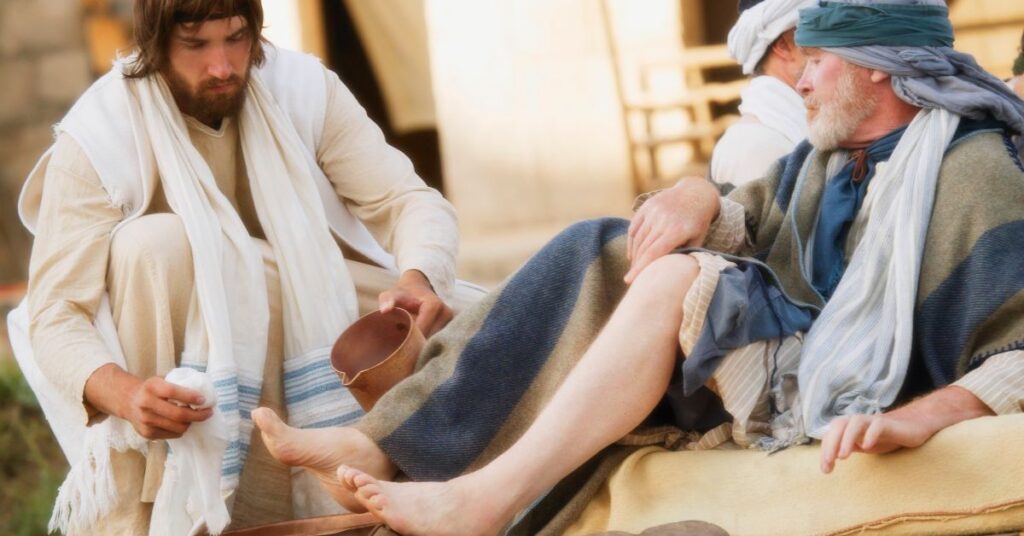One of the biggest draws to the Super Bowl every year is getting to see the commercials. There is usually much discussion after the game over which commercial was the funniest or the sappiest or had the most celebrity appearances. But there is always some commercial that generates conversation based on its controversy. Interestingly, the biggest controversy has been over the “He Gets Us” ad…the one supposedly about Jesus.
In case you missed it, the ad depicts many different people from all different backgrounds having their feet washed, such as an immigrant mother, a Muslim woman, a gay man, a Native American, an elderly white man, a young girl at an abortion clinic, and an African-American young adult on the street. The ad ends with the statement, “Jesus didn’t teach hate. Jesus washed feet.” Then it cuts to the tag line of “He gets us. All of us.” To this point, their website includes a statement written in bold that Jesus even washed the feet of Judas, the one who betrayed Him. However, it also includes the statement that the foot washing was a symbol of how Jesus’ followers should treat each other.
Understandably, it has provoked quite the mixed reaction. Many people have derided the ad, saying it implies all behaviors and all walks of life should be approved by the church and Christians. Others have applauded the ad, saying it is calling out the church and Christians to be more loving to those who are different from them. In response, Pastor Mark Driscoll tweeted, “Jesus washed Judas’s feet and still sent him to hell.” And in response to that, the “Father” Nathan Monk has claimed that Judas isn’t even in hell as he erroneously concludes there is no such thing as hell. All of this indicates, whether you approve of the ad or not, that both sides are typically drawing the same conclusion from the ad: that foot washing equates to the approval of one’s behavior and lifestyle choices.
The website of the He Gets Us movement has a landing page with a lengthy description of what it means to wash another’s feet. Foot washing in biblical times was a gesture of hospitality by washing a guest’s feet since his feet would be dusty and dirty from traveling. It is also something Jesus did to His disciples on the night of His arrest. While in the upper room after having the Passover meal, Jesus knelt down on the floor and washed His disciples’ feet. He was demonstrating to them the model of loving humility. After washing their feet, Jesus stated, “Do you know what I have done to you? You call me Teacher and Lord, and you say well, for so I am. If I then, your Lord and Teacher, have washed your feet, you also ought to wash one another’s feet. For I have given you an example, that you should do as I have done to you.”
One of the main points made by the He Gets Us group in this ad, and many of those who support it, focuses on the fact that Jesus also washed the feet of Judas, the one who betrayed Him. They use this fact to insist that all people – whether they are following Jesus, betraying Jesus, denying Jesus, or spitting on Jesus – should have their proverbial feet washed by those who profess to follow Jesus. Thus, the ad features the “outcast” of our society having their feet washed by everyone else – the white suburban mom washing the feet of the immigrant; the police officer washing the feet of the criminal; the priest washing the feet of the gay man.
What is interesting is this ad falsely combines a few concepts from the Scriptures to try to make somewhat of a valid point. This is why it is so controversial – and too complicated to really address in a pithy tweet. It comes down to the question: does the washing of feet simply mean love or does it mean approval of one’s choices and behavior? Let’s look at that in light of biblical truth.
First, yes, Jesus washed the feet of His disciples – all twelve of them – including Judas. However, if we are going to frame up our entire theology on the feet washing incident (as the He Gets Us group appears to want to do), we would do well to consider ALL the words spoken by Jesus during this event. If you look at the account written by the disciple John, who was there for the whole thing, John sets the scene by saying after they had eaten supper and after “the devil had already put it into the heart of Judas Iscariot, Simon’s son, to betray Him,” Jesus then began washing their feet. Peter, obviously confused by such a lowly, servant act, questioned why Jesus was washing their feet when he thought it should be the other way around. Jesus answered Peter’s protest by stating, “If I do not wash you, you have no part with Me…He who is bathed needs only to wash his feet, but is completely clean; and you are clean, but not all of you.” And John adds, “For He [Jesus] knew who was to betray Him; that was why He said, ‘Not all of you are clean.’” Though Judas had his feet washed to see the symbolism of loving humility, he was not clean according to Jesus.
In other words, yes, Jesus washed the feet of Judas, but that did not make what Judas did acceptable in the eyes of God. In fact, it didn’t even spiritually clean Judas since after He washed Judas’s feet, Jesus still said that they were not all clean. He even continued by saying, “I do not speak concerning all of you. I know whom I have chosen; but that the Scripture may be fulfilled, ‘He who eats bread with Me has lifted up his heel against Me.’” And then Jesus identifies who would betray Him.
Furthermore, after Judas departs from the group to betray Jesus, a moment that John describes as “Satan entered into Judas,” Jesus then continues to teach and even pray over the remaining eleven disciples. Jesus tells them how the Holy Spirit would indwell them to help them (notice this is without Judas present); Jesus tells them that they will bear witness to the truth about Jesus (notice this is without Judas present); Jesus assures them that the Father loves them because they have believed He came from God (notice this is without Judas present). Finally, Jesus prays to the Father about the disciples, “While I was with them in the world, I kept them in Your name. Those whom You gave Me I have kept; and none of them is lost except the son of perdition, that the Scripture might be fulfilled.” The “son of perdition” refers to Judas.
So what does the foot washing by Jesus do? It demonstrates humble, loving service to others. How do we know that? Because that is what Jesus says it is. After washing their feet, Jesus states, “Truly, truly, I say to you, a servant is not greater than his master, nor is a messenger greater than the one who sent him.”
Biblically, then, washing feet is about showing loving humility to others, having a servant’s heart. If this is what the ad is about, that we should love one another, then they would be correct. However, there are lots of places in Scripture to draw from to underscore Jesus’ commandment to love others. In fact, just a few verses after Jesus washed their feet, He instructs them, “A new commandment I give to you, that you love one another: just as I have loved you, you also are to love one another. By this all people will know that you are my disciples, if you have love for one another.” (John 13:34-35)
When asked by the Pharisees about the greatest commandment Jesus said it was to love the Lord God with all your heart, but He said the second greatest commandment is to love your neighbor as yourself (Matt. 22:37) Jesus even said, “Love your enemies, do good to those who hate you, bless those who curse you, pray for those who abuse you.” (Luke 6:27-28).
Can the church and all Christians be reminded of this? Absolutely! Could we do better about loving those who are different from us? Absolutely. We all could. So why didn’t the ad use those scriptures to make their point? Why did this group focus on the foot washing of Judas? I think that’s a legitimate question to ask.
So what does the foot washing by Jesus not do? It does not say that all lifestyles, life choices, and behaviors are approved by God. How do we know that? Because Jesus does not approve of what Judas does. He refers to Judas as the “son of perdition” and “not clean.” And in John 6 Jesus says, “Did I not choose you, the twelves, and one of you is a devil?”
Jesus, though He loves all sinners, came to redeem sinners from their sins, to call them to repentance and to live a life of righteousness. He did not come to approve of sinful choices; He came to change us to choose righteousness. And everywhere Jesus preached, He emphasized that we are to turn away from our evil deeds, to repent from our sins.
When Jesus sent the twelve disciples out – including Judas – He told them to preach that people should repent. In John 2, Jesus cleanses the temple to drive out the moneychangers wanting them to change their ways of desecrating the temple. In John 3, Jesus describes the condemnation of the world that men loved darkness rather than the light because their deeds were evil. John the Baptist reiterates that for those who do not believe in the Son, the wrath of God remains on them. Jesus confronts the woman at the well by pointing out her sinful lifestyle. In John 5, after Jesus heals a paralytic, He tells the man, “See, you have been made well. Sin no more lest a worse thing come upon you.”
Jesus then adds in John 7:7, “The world cannot hate you, but it hates Me because I testify of it that its works are evil.” In John 8:21 Jesus addresses the Pharisees, “I am going away and you will seek Me, and will die in your sin. Where I go, you cannot come.” Jesus is telling them they will die in their sins and will not see heaven, indicating they would be in hell. He continues, “Whoever commits sin is a slave of sin. And a slave does not abide in the house forever, but a son abides forever. Therefore, if the Son makes you free, you shall be free indeed.”
Biblically, then, washing feet is not about approving of one’s sin choices. If this is what the ad is about, then it is clearly wrong. Jesus does command us to love one another, but Jesus came into this world to bring us out of the darkness of our sins. He came to break the bondage of sin over us in our lives so that we may have life in Him. He did not come to approve of sinful behavior.
If you read of Jesus washing the disciples’ feet – including the feet of Judas – and the takeaway you have is that Jesus approves of all people and their choices, then you need to read the rest of Scripture. Nowhere does Jesus think lightly of sin nor does He approve of sin by His humble act of washing the disciples’ feet. Rather, His express purpose in coming to earth to die on the cross and resurrect the third day was, in the words of the angel Gabriel, to “save the people from their sins.” As Peter says in 1 Peter 2:24, “And He Himself bore our sins in His body on the cross, so that we might die to sin and live to righteousness; for by His wounds you were healed.”
Whatever motive was behind the ad, the He Gets Us movement wanted to focus on loving those who are different. But it could have pointed out that we are actually all the same – we are all sinners in need of a Savior. We should love one another because we are commanded to love by God. And from that love for one another, we should point everyone to the Savior who alone can rescue us from our sin, whatever sin that may be. God’s love for us does not mean He approves of our sin. God’s love for us means He redeems us out of our sin to walk in the newness of life in Him.





2 thoughts on “What Does This Really Mean?”
You will notice that the ad does NOT have a Black man washing the feet of a KKK member, or a Jewish person washing the feet of a Nazi, or a Democrat washing the feet of Donald Trump – yet all 3 potential recipients are sinners.
The reason that the ad does not have those examples is because it is only punching in one direction – to the Right. The makers of the ad are cultural Marxists masquerading as “Christians.”
The most insidious part of the ad, if you look closely, is the depiction of sidewalkers in front of the “Family Planning Clinic,” ie, murder mill, who supposedly ignore the abortion minded, or post-abortive, woman instead of washing her feet. Yet, the sidewalkers in that scene are the only ones who actually care about the lives of the unborn children being ripped apart inside and the souls of the mothers, both of which are FAR more important than the cleanliness of the woman’s feet. (Jesus never instructed us to wash feet anyway.)
Why would the ad depict sidewalkers this way? Because the goats on the Left are complicit with the workers inside of the “clinic” who have murdered 65 million innocent defenseless children in the womb. And the ones who are not directly complicit are put to shame by the sidewalkers who demonstrate, quite clearly by their mere presence, that the lukewarm don’t make the Kingdom either.
So, like the serpent of old in the Garden, the makers of this ad inject an ounce of truth (humble servitude) mixed with a pound of lies (cultural Marxism) to confuse many on the Faith once handed down from Jesus Christ. In that sense, it is an ad masquerading as light in a culture long ago gone astray and an impotent “church” that has lost its way.
I love your phrasing of “an ounce of truth (humble servitude) mixed with a pound of lies (cultural Marxism).” I think that was really the summary of the issue here. A small amount of truth hidden in a bucket of lies is definitely Satan’s way of getting us to buy into things that are not from God.
Comments are closed.